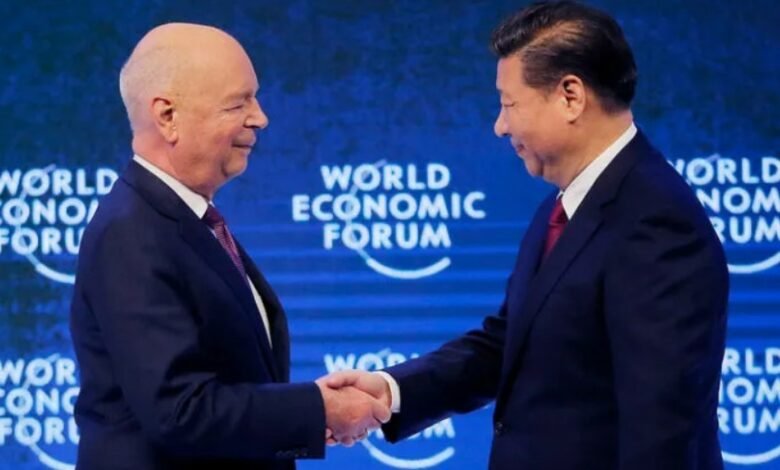WEF Slammed for ‘Importing’ China’s Communist ‘Culture’ into West to Usher in ‘Great Reset’ Agenda

The World Economic Forum (WEF) and its founder Klaus Schwab have been slammed by an international policy think tank for “importing” the “culture” of China’s Communist dictatorship into the West. The Gatestone Institute accuses the WEF of trying to replace governmental systems in Western nations with totalitarian Chinese Communist Party-style sociopolitical, philosophical, and economic ideology.
On Friday, the Gatestone Institute’s J.B. Shurk issued a warning that the WEF’s plan will result in a tyrannical system in which “a small group of elites bark orders and ordinary citizens dutifully obey.”
The effort to replace current systems in the West with CCP-style totalitarianism is all part of Schwab’s “Great Reset” agenda.
It is “bizarre … to see so many international institutions today looking to China for global guidance,” Shurk notes.
Shurk singles out Schwab and noted that he “routinely applauds China’s surveillance State for its capacity to ‘nudge’ citizens toward compliance.”
“It is deeply unsettling to see a destroyer of civilizations held up as the future for global civilization,” he writes.
American and Western conservatives are sounding the alarm about the potential for a CCP-style “social credit system,” possibly enforced through a national digitized currency or “central bank digital currency” (CBDC), being forced on the public, as WND notes.
The libertarian group CATO writes that in addition to potentially spelling “doom for what little financial privacy protections remain” for citizens, “a CBDC would provide COUNTLESS OPPORTUNITIES for the government to control citizens’ financial activity.”
At the same time, private mega-corporations friendly to leftist social engineering, like Chase Bank, are implementing their own “social credit” systems by which they cancel and punish individuals and groups that dissent from various woke agendas, from climate change to LGBTQ to anti-gun activism.
The World Economic Forum, established by Schwab in 1971, claims that it “engages the foremost political, business, cultural and other leaders of society to shape global, regional and industry agendas” and “strives in all its efforts to demonstrate entrepreneurship in the global public interest while upholding the highest standards of governance.
“Moral and intellectual integrity is at the heart of everything it does.”
But Shurk sees little integrity in promoting Communist China as a model for free Western societies: “While China apologists turn a blind eye to the one-party communist State’s continuing genocides against Christians, Tibetans, Uyghurs, Falun Gong practitioners, and other minorities, they champion the machinery of China’s technocratic totalitarianism as a model for the rest of the world.”
Shurk describes what a Maoist-style “Cultural Revolution” would do to the West, by first describing how it “wiped out” China’s rich history:
China’s traditional way of life had survived thousands of years of intermittent civil war, foreign aggression, bouts of famine, and Western sabotage.
When the virus of communism took root in its lands, however, China’s vibrant history was wiped out within a generation.
Two and a half decades ago, several academics made a laudable effort at calculating the costs of communism in the twentieth century in “The Black Book of Communism: Crimes, Terror, Repression.”
While that work capably catalogues how communist governments systematically murdered a hundred million citizens and tortured many more, it only begins to describe the immense destructive force communism has had on the Chinese people.
If Western Civilization had endured a similar “Cultural Revolution,” it would be as if all of the great ideas from Greek democracy, Roman republicanism, Judeo-Christian theology, Enlightenment reason, the Scientific Revolution, and the preservation of individual liberty had disappeared overnight.
Imagine deleting from history Aristotle, Cicero, Augustine, Aquinas, da Vinci, Michelangelo, Shakespeare, Locke, Jefferson, and every other thinker, writer, artist, inventor, and statesman in between.
That is the depth of the cultural genocide communism has perpetrated against the Chinese people in addition to the tens of millions of victims slaughtered and expunged from collective memory.
Reaching back to the Clinton years, when Communist China was first offered “Most Favored Nation” trading status, Shurk writes that, “Excusing China’s totalitarianism and handing the communist nation the keys to enriching itself from lucrative global markets may well prove to have been the most consequential foreign policy error in centuries.”
“Instead of bringing greater prosperity for Americans, as then President Clinton and Secretary of State Madeleine Albright promised at the time, normalizing trade relations with China has devastated the United States’ once robust industrial and manufacturing self-sufficiency, impoverished blue-collar workers across the country, and left ordinary Americans dependent upon an often hostile geopolitical foe for critical raw materials and finished products,” he writes in the Gatestone article.
“Rather than providing a mechanism for ‘democratizing’ a closed communist State, bringing the world’s economy to China’s doorstep has only hardened its iron-grip authoritarianism, encouraged its regional saber-rattling, expanded its capacity to inflict harm on ordinary Americans, and cemented its geopolitical clout,” he states.
Citing George W. Bush’s claim that “Open trade is a force for freedom in China, a force for stability in Asia, and a force for prosperity in the United States,” Shurk writes.
“Those were all commendable goals, but good intentions frequently bring disastrous results.”
“If Bush had known in 2001 that America’s blue-collar workforce would be languishing today, that China would be killing tens of thousands of Americans each year with fentanyl while stealing American companies’ proprietary technology, and that global institutions such as the World Health Organization and World Economic Forum would be actively promoting the Chinese Communist Party’s technocratic surveillance State, perhaps he would not have been quite so eager to empower China through unfettered trade.”
Shurk offers a devastating take on WEF and the “Great Reset” agenda:
For all its emphasis on science and technology, and despite its dazzling visions for the future, the “Great Reset” follows in the footsteps of China’s cultural desolation.
Schwab’s influential organization seeks to recreate a Chinese system where a small group of elites bark orders and ordinary citizens dutifully obey.
It chases a bleak existence where freethinking is viewed as “dangerous” and State dogma is embraced on faith.
It wishes to construct a civilization devoid of lively culture where forms of artificial intelligence build out the world and human innovation wastes away.
The “Great Reset” is a twenty-first century “Cultural Revolution” intended to purge the West of its “old ways.”




